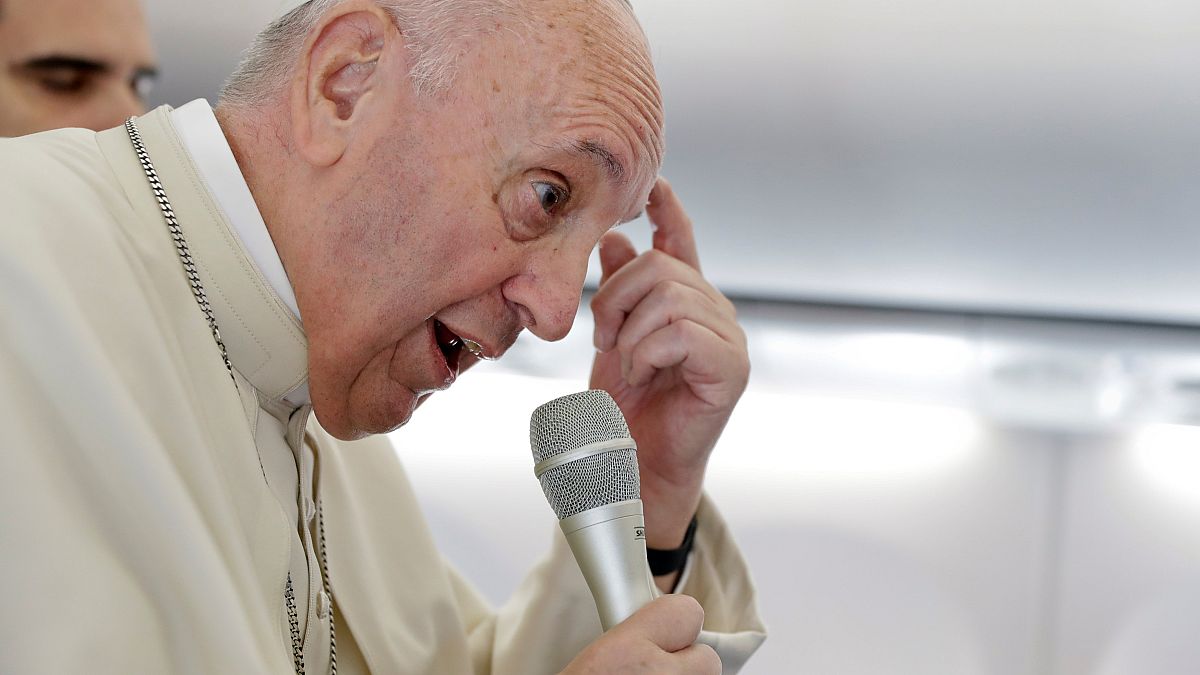According to the Pope, Europe is "overcome by pessimism or by ideologies" after Italy, Britain, France and Poland elected nationalist politicians into the European Parliament
Pope Francis once again came back on the topic of political division after the European elections saw far-right parties make considerable gains in Italy, Poland, Britain and France.
"Politicians should never sow hate and fear, only hope", the Pope said answering a question on the future of Europe, on his way back from Romania on the papal plane.
Showing concern towards the fate of a Europe that he sees "attacked not by cannons or bombs, but by ideologies", he underlined the importance of learning from history to avoid the horrors of the First and Second World War.
The comment came only a few days after the Pope, in the wake of the results of the EU elections, had expressed his worry that fears and doubts concerning migrants were conditioning "our way of thinking and acting to the point of making us intolerant, closed and perhaps even – without realising it – racist". Openness, he said, was not just about migrants, "it's about humanity".
His trip to Romania was punctuated with similar calls for openness, forgiveness, and unity. Meeting with the leader of the Romanian Orthodox Church, Patriarch Daniel, the Pope underlined the importance of working together not only to curb the tide of secularism but also to combat the "growing sense of fear that, often skilfully stoked, leads to attitudes of rejection and hate.”
He further condemned discrimination when he met with representatives of the Roma community in Blaj, in the central region of Transylvania. “I ask forgiveness – in the name of the Church and of the Lord – and I ask forgiveness of you for all those times in history when we have discriminated, mistreated or looked askance at you", Francis told the Roma, who have been historically persecuted throughout Europe and are still easily scapegoated around the continent.
A history of clashes with the far right
Only a month ago, the Pope had already caused controversy in Italy after he had decided to invite over 500 Roma people to the Vatican, including a family that had faced racist attacks from far-right protesters on the outskirts of Rome. Italian Interior Minister and leader of the right wing Lega party Matteo Salvini, who has been vocal about his mistrust of Roma people for years, had answered by repeating his promise to close all Roma camps in the country.
The Pope and Salvini have also clashed repeatedly on the theme of migrants, to the point that Italian national newspaper Il Fatto Quotidiano published claims according to which the Pope was outright refusing to meet with Salvini "until he changes his language and policies".
In May, the Pontiff rejected anti-immigration policies once more when he commented on the situation at the U.S.-Mexican border: "I don’t know what’s happening with this new culture of defending territories by building walls. We already knew one, Berlin, which brought so many headaches and so much suffering,” he said, adding that " those who build walls end up being prisoners of the walls they build."
Before that, the Holy See's diplomatic leadership was considered fundamental in the signing of UN-sponsored Global Compact on migration in Morocco in late 2018, and Francis dedicated his 2019 start-of-the-year speech to the ambassadors to the Holy See to the importance of multilateralism.
The right strikes back
A signature campaign urging bishops to denounce him as a heretic because of his stances on topics ranging from religious diversity to communion for the divorced started circulating in early May.
Answering questions about the campaign, Reuters reports the Pope took it lightly. “I pray for them because they are wrong, and, poor people, some of them are being manipulated," he said.
Meanwhile, conspiracy theories claiming that the Pope is illegitimate and calling for a return of Pope Benedict XVI have been circulating for years, to the point that Salvini himself published a picture of him holding a t-shirt that reads "My Pope is Benedict" back in 2016.
The Pope has also been heavily criticised by Steve Bannon's Dignitatis Humanae Institute, a Catholic-inspired institution based in Italy working to spur new populist movements throughout Europe.
